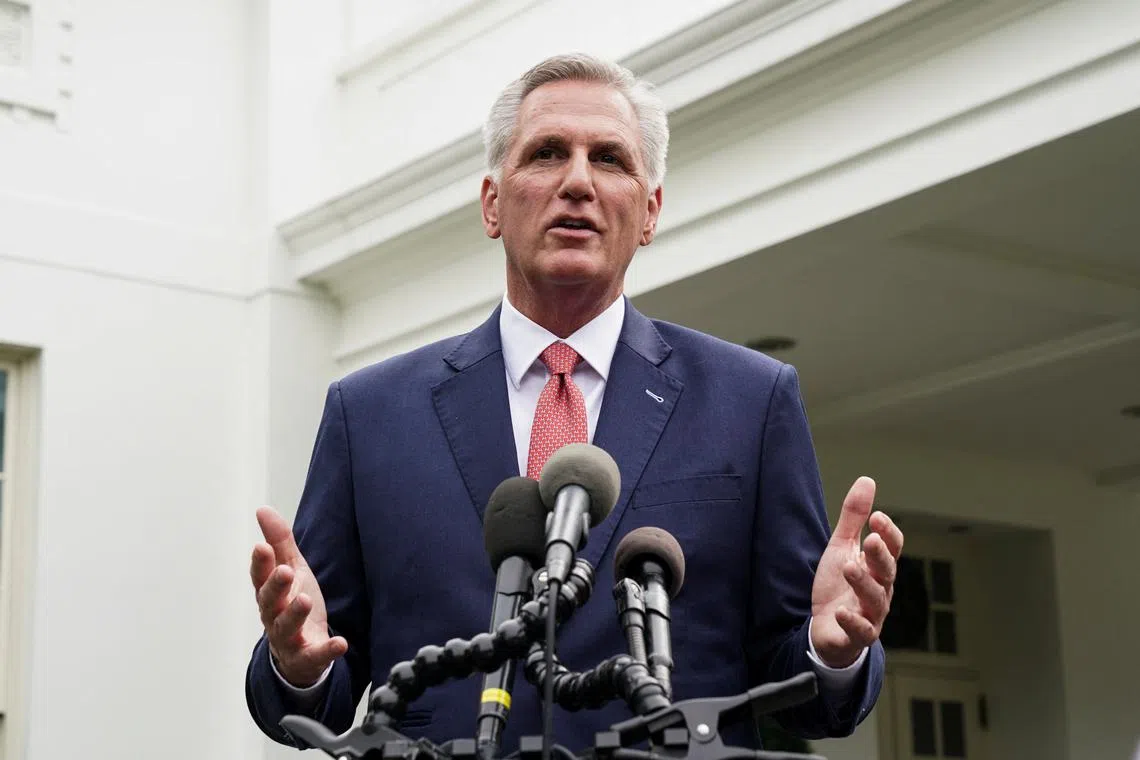McCarthy says debt ceiling deal possible this week as Biden cuts short Asia trip
Sign up now: Get ST's newsletters delivered to your inbox

House of Representatives Speaker McCarthy told reporters United States President Joe Biden is trying to reach a debt ceiling deal by June 1.
PHOTO: REUTERS
WASHINGTON - Democratic President Joe Biden and top congressional Republican Kevin McCarthy’s US debt ceiling negotiations ended on Tuesday after less than an hour, as the looming fear of an unprecedented American debt default prompted Mr Biden to cut short an upcoming Asia trip.
But the meeting ended on an upbeat and unexpected note as Mr McCarthy, coming out of the meeting with Mr Biden and other congressional leaders, said: “It is possible to get a deal by the end of the week.”
The House of Representatives Speaker told reporters that Mr Biden was trying to reach a debt ceiling deal by June 1
“We’ve got a lot of work to do in a short amount of time,” Mr McCarthy told reporters, saying the less-than-an-hour session had set the stage for future conversations.
Mr Biden and Mr McCarthy sat down in the Oval Office with Senate Majority Leader Chuck Schumer, House Democratic leader Hakeem Jeffries and Senate Republican leader Mitch McConnell.
The President leaves on Wednesday for a three-day Group of Seven (G-7) summit in Japan.
The White House announced on Tuesday that Mr Biden had decided to skip stops in Papua New Guinea and Australia after the G-7 meeting.
Ahead of the Oval Office meeting, Mr Biden and Mr McCarthy’s aides were in negotiations over raising the government’s US$31.4 trillion (S$42.2 trillion) debt ceiling to avoid an economically catastrophic default, and discussed the requirements for two key programmes that provide food and cash aid to families.
Expanding work requirements has been a key demand of Republicans, who are also pushing for spending cuts in exchange for their votes to raise the debt limit.
Mr Biden and Mr McCarthy have little time to strike a deal.
On Monday, the Treasury Department reiterated its warning that it could run short of money to pay all its bills as soon as June 1, triggering a default that economists say would likely spark a sharp economic downturn.
Mr McCarthy on Tuesday told reporters that his party, which controls the Chamber by a 222-213 margin, would agree only to a deal that cuts spending.
“We can raise the debt ceiling if we limit what we’re going to spend in the future,” he said.
Both parties agree on the need for urgent action.
In the past week, staff for both sides have discussed a range of issues, including spending caps, new work requirements for some benefit programmes for low-income Americans, and changes to energy permitting in exchange for votes to lift the limit, according to people briefed on the talks.
The sources, who spoke on condition of anonymity to reveal details about closed-door negotiations, said the work requirement discussions focused on the Supplemental Nutrition Assistance Programme, previously known as food stamps, and the Temporary Assistance for Needy Families programme.
Mr Biden alluded to the talks in public remarks over the weekend, saying he would not consider such a move for the Medicaid health programme for low-income Americans.
“The President has been clear that he will not accept proposals that take away people’s health coverage,” said White House spokesman Michael Kikukawa. “The President has also been clear that he will not accept policies that push Americans into poverty. He will evaluate whatever proposals Republicans bring to the table based on those principles.”
Previous downgrade
A similar 2011 stand-off over the debt limit led to a historic downgrade of the US credit rating, sparking a sell-off in stocks and pushing the government’s borrowing costs higher.
The current deadlock has rattled investors, sending the cost of insuring exposure to US government debt to record highs. A Reuters/Ipsos poll completed on Monday found that three-fourths of Americans fear a default would take a heavy toll on families like theirs.
“Nobody should use default as a hostage,” Mr Schumer said in a Senate speech on Tuesday. “The consequences would be devastating for America.”
Some observers have raised concerns that the five-party talks are too unwieldy to make progress.
No. 2 Senate Republican John Thune told reporters the talks appear to have “too many cooks”.
“As we’ve said all along, it is Biden and McCarthy,” Mr Thune said. “So, whoever can actually speak on behalf of the President needs to get in the room, and get McCarthy’s best people in there, and get it done.”
Mr McCarthy himself said he would prefer one-on-one talks with Mr Biden.
“If the President comes to an agreement, the Democrats in the Senate will vote for it. The House will pass it, if we are all in agreement,” said Mr McCarthy.
“Why do we waste more time going around and around, not solving any of the real problems? I think you’re putting the country in jeopardy when you do that.” REUTERS


